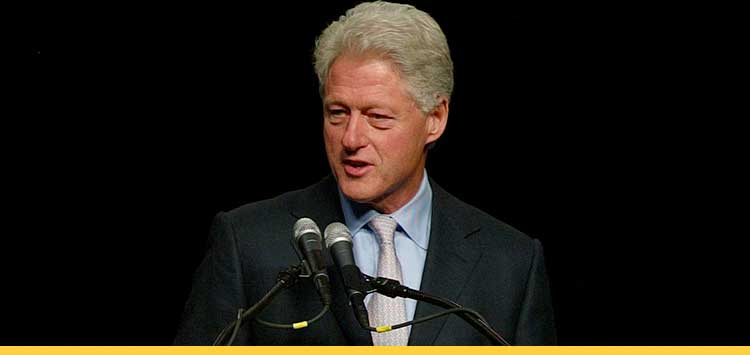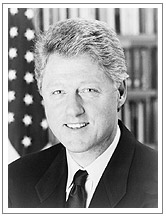CONFERENCE | ABOUT CLINTON | ABSTRACTS | PRESS RELEASES | CREDENTIALS | CONTACTS
Presidential Conference Press Room
About Bill Clinton
Bill Clinton was born William Jefferson Blythe III on August 19, 1946, in Hope, Arkansas, three months after his father died in an automobile accident. In high school, he took the name of his stepfather, Roger Clinton, of Hot Springs, Arkansas.
Bill Clinton graduated from Georgetown University and was awarded a Rhodes Scholarship to Oxford. He received a law degree from Yale in 1973. After graduation, he returned to Arkansas and taught law at the University of Arkansas before entering politics. His 1974 campaign for Congress ended in defeat, but two years later he was elected Arkansas Attorney General.
In 1975, Bill Clinton married Hillary Rodham, whom he had met while a law student at Yale. In 1980 Chelsea, their only child, was born.
Bill Clinton was elected governor of Arkansas in 1978, but lost a bid for reelection in 1980. He regained the governorship four years later and served until 1993. During his 12 years in office, Governor Clinton earned national recognition for his progressive programs, especially his efforts to improve the quality of public education.
After a tough primary campaign, Bill Clinton won his party's nomination and went on to defeat Republican President George Bush, and independent candidate Ross Perot in the 1992 presidential race. When President Clinton won reelection in 1996, he became the first Democrat since Franklin D. Roosevelt to win a second term.
Following the early failure of his health care reform initiative, President Clinton pursued a moderate but progressive domestic agenda. During his tenure, the welfare system was reformed, the sale of handguns was restricted, environmental regulations were strengthened, and a massive federal budget deficit was turned into a surplus.
On the international scene, the Clinton Administration expanded international trade, intervened militarily to end "ethnic cleansing" in Bosnia, launched peace and trade initiatives in Africa and the Middle East, and promoted a framework for peace aimed at ending the strife in Northern Ireland.
In 1998, his relationship with a young White House intern resulted in the President's impeachment by the House of Representatives. A trial in the Senate found the President not guilty of the charges brought against him. President Clinton apologized for his conduct and vowed to keep working as hard as he could for the American people. As a result, Bill Clinton left office with historically high approval ratings for the job he had done as the 42nd President of the United States.

